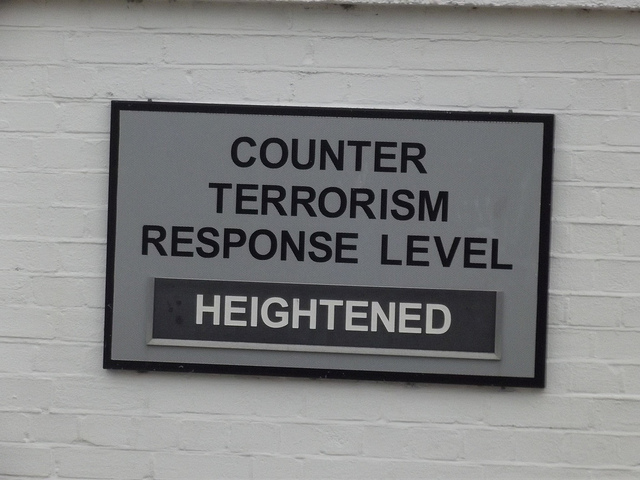 Sign at Portsmouth Dockyard, UK
Sign at Portsmouth Dockyard, UK
Radicalization Part 3: Mitigating the Threat of Terrorism
To mitigate the threat of terrorism, governments have two options: adopting a proactive policy or a reactive policy. A proactive policy is a long-term approach that addresses the roots of radicalization as a way to prevent future terrorist attacks. A reactive policy is a short-term approach that typically involves the mobilization of security forces immediately following a terrorist attack and the rapid increase in surveillance/law enforcement capabilities in order to restore a sense of security to the country. Within each policy approach, an array of programs and plans are already in effect or have been implemented to mitigate the threat of terrorism.
Proactive Policy: Actions & Programs
The Department of Homeland Security (DHS) has designed an approach to counter violent extremism that primarily focuses on preventing violent attacks. It “addresses all forms of violent extremism, regardless of ideology,” and emphasizes the strength of local communities in its efforts to mitigate radicalization. The approach is based on the premise that resilient, well-informed communities “represent the best defense against violent extremist ideologies.” The White House recently created the Countering Violent Extremism (CVE) Task Force, thus cementing CVE as a homeland security imperative. It is an interagency task force hosted by the DHS and comprises of leaders from the DHS and DOJ, as well as the involvement of the FBI, the National Counterterrorism Center, and other federal agencies.
In response to ISIS’ online propaganda machine, the Center for Strategic Counterterrorism Communications (CSCC) assembled and distributed short clips to inform and dissuade people from joining ISIS. Created in 2011 as a special unit within the State Department, the CSCC was charged with finding ways to contain the spread of militant Islamist ideology. Overall, the center struggled to generate convincing counterpropaganda material, with critics deeming its video clip ISIS Land as “embarrassing” and wholly unsuccessful, as it was unclear whether the clip had in fact discouraged potential militants from traveling to Syria. In an effort to improve upon the struggling CSCC, the State Department recently announced that it is revamping its counter-violent-extremism communications initiative through a new Global Engagement Center.
Since 9/11, the FBI has used an abundance of “sting operations” to prevent aspiring Islamist extremists from committing acts of violence. These operations have proved highly effective in uncovering potential terrorist plots and disrupting them before they could come to fruition.
As far as domestic terrorism is concerned, the US, unlike Europe, does not have many programs designed specifically to deal with white supremacist groups and similar hate groups. Among the few programs that exist is a private, nonprofit organization called Life After Hate (LAH). Recently started by former hate group members, the organization provides testimonials and training to law enforcement, schools, and community groups across the US.
Reactive Policy: Actions & Programs
Immediately after the Paris attacks, French President Francois Hollande declared a state of emergency that mobilized thousands of security forces within the country and gave them vast new powers. Authorities have conducted over 1,000 searches and approximately 120 people have been arrested.
Right after 9/11, the US government passed the Patriot Act. In the name of preventing terrorism and protecting national security, the act granted extraordinary surveillance powers to the FBI, effectively allowing them to monitor phone and email communications, collect bank and credit reporting records, and track the Internet activity of Americans, regardless of whether they were connected to terrorism or not. Although it was intended to investigate potential terrorists, critics warned that its sweeping surveillance provisions would be used for matters other than terrorism. A 2007 report from the Justice Department found evidence that the FBI had seriously abused its powers under the Patriot Act. Many of the people involved in those FBI cases had no clear connection to terrorism.
Proactive vs. Reactive Policies
In keeping with the values and civil liberties of democratic countries, it is more beneficial to maintain a long-term proactive policy than a long-term reactive one. As aforementioned, proactive policy programs conduct effective law enforcement operations, reach out to people, and engage with local communities. They emphasize compassion and discussion with others as ways of mitigating radicalization and preventing future acts of terror.
A reactive policy, on the other hand, is more effective as a short-term approach because it is useful for restoring security and order in the immediate aftermath of an attack. The problem with having a long-term security response, like the Patriot Act or France’s state of emergency, is that it can increasingly violate civil liberties the longer it remains in effect. Herein lies the balancing act of maintaining the constitutionality of law and protecting the rights of innocent civilians, while tightening security and surveillance measures in the name of national security.
Conclusion
The governments of the US, France, and others should prioritize their democratic values and the civil liberties of innocent civilians when formulating policies to prevent future acts of terrorism. While long-term proactive policies and short-term reactive policies can work in tandem, emphasis must be placed on proactive policies. Successfully countering the radicalization and recruitment efforts of extremist groups requires an understanding of the radicalization process, the sources of radicalization, and the consequences of enacted policies.





